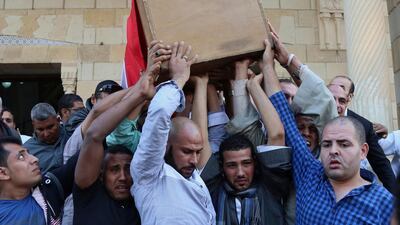CAIRO // Egypt's president vowed on Sunday to press ahead with the country's war against terrorism after one of the worst attacks against the police in years.
The authorities have confirmed just 16 deaths but most reports said more than 50 policemen were killed in the clash between militants and police forces in the Western Desert on Friday.
"Egypt will continue its confrontation against terrorism and those financing and standing behind it, with strength, decisiveness and efficiency, until it's curbed," Abdel-Fattah El Sisi said, at a meeting with his top security officials.
Egyptian security analysts and diplomats based in Cairo said that conflicting information about the fighting makes it difficult to know which armed group carried out the attack.
The clash occurred after state security officers received a tip about a terror base 135 kilometres away from Cairo, leading to a raid that by all accounts went badly for the government’s forces.
“What had happened was not a mere isolated assassination trap, nor an attack on a bank in a border city,” former prime minister Ahmed Shawfik, said. “It was a full military action organised unjustly against the most able, capable and honest of our sons.”
Despite an initial claim of responsibility by the Hasam Movement - often tied by the authorities to the banned Muslim Brotherhood - security services now think the police-raid turned terror-ambush was carried out by either Al Qaeda and ISIL branches in Egypt.
On Saturday chief prosecutor Nabil Sadek ordered the State Security Agency to investigate the shootout in Al Wahat as the implications rattle both the authorities and the Egyptian public.
“The operation on Friday was to arrest a group linked to Hisham Ashmawy,” said a source in the Egyptian judiciary familiar with the investigation. “But nothing is clear yet and ISIL and Hasam are also possibilities.”
Hasam translates into “decisiveness” in English, but the name of the group is also an acronym for Harakat Sawa'd Misr, which literally means “Arms of Egypt Movement”.
The attack on Friday was close to a geographical operations area often ascribed to Hasam — labelled by officials in Cairo as a Muslim Brotherhood linked group.
Hasam first emerged last year claiming the assassination of National Security officer Ibrahim Azazi outside his suburban Cairo home in July.
It also took responsibility for a December 2016 raid that killed six police officers at a Giza checkpoint - an operation significantly closer to the capital than Friday’s attack.
But the use of heavy weapons to ambush the police detachment leads investigators towards believing an extremist group other than Hasam carried out the Western Desert ambush.
Terrorism researchers said the suspected Al Murabitun organisation was established in Derna, Libya, by the former Egyptian army officer Hisham Ashmawy, who in turn was previously active in Ansar Beit Al Maqdis, a militant group mostly active in Sinai.
“In November 2014, Ansar Beit Al Maqdis rebranded itself as ISIL in Sinai Province, but Ashmawy and others disagreed with that decision,” said Issandr El Amrani, North Africa Project Director at the International Crisis Group.
A former special services officer, Ashmawy, is fully aware of the competencies and deficiencies among the different branches of Egypt’s armed forces as well as the anti-terror police detachments under interior ministry command.
On Saturday Ashmawy’s ideological cousins in the Al Qaeda linked Sharia Guardians faction "celebrated" the attack in their social media channels.
Meanwhile, mainstream journalists in Egypt focused on the professionalism of the attackers –angrily contrasting it with a lack of preparedness on the part of the ambushed police detachment.
“An officer said we are depending on appearance only and the terrorists would flee when they saw our new vehicles” said an unidentified recruit-whose audio account of the attack was broadcast on Ahmed Moussa’s highly rated Sada El Balad TV programme.
“There was shooting on us from everywhere, I crawled on the ground, took the car and left,” said the survivor, whose account reportedly was recorded at the injuries ward of the interior ministry’s hospital in the Agouza neighbourhood of Giza.
Now Ahmed Moussa is being investigated by the government directed Media Syndicate.
“The inaccurate details that aired on Moussa’s show are a violation to basic media regulations that are based on the reliability of a source; especially when concerned with issues relating to national security,” said Tarek Saadah, the Media Syndicate’s chairman.
Egypt’s state information service has criticised media outlets reporting higher casualty figures for the Al Wahat attack than those released officially by the interior ministry.
Both Reuters and the BBC put Friday’s casualty toll at 52 dead policemen including 23 officers according to Reuters, and 18 according to BBC.
“Professionally speaking, it is not appropriate that two of the most prominent media outlets in the world make grave professional mistakes by relying on what they called unidentified security sources,” said State Information Service chairman Diaa Rashwan “they both did not wait or resort to official security authorities to get correct information.”
The media clampdown has discouraged normally available analysts at Cairo universities and think tanks from speaking on the record, itself a sign of the shock to the system caused by Friday’s attack.
“The attack places the Ministry of Interior under greater scrutiny, because it appears to have been caught off-guard by the abilities of the militants,” sad the International Crisis Group’s Mr El Amrani. “The way it is handling the fallout is being closely scrutinised in Egyptian media, partly because the government has put out unreliable information in the past and because leaks have put victims at over 50 while the official figure is much lower.”

